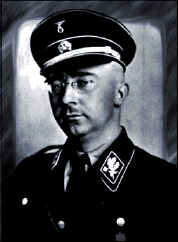|
||
|
"Be careful what you say. I think the two men at the table in the corner may be Gestapo." How many times is that line spoken in adventure movies of the World War II years and even in radio adventure shows set in Nazi Germany! The Gestapo (Geheime Staatspolitzei) were Adolf Hitler's political police from 1933 to 1945. They had unlimited power of search and seizure and the power to arbitrarily imprison suspects without a trial. There was no appeal from their decisions.
Heinrich Himmler
The Geheime Staatspolizei (German for Secret State Police, abbreviated "Gestapo") was formally organized after the Nazi's seized power in 1933. Hermann Göring, the Prussian minister of the interior, detached the espionage and political units of the Prussian police. And staffed them with thousands of Nazis. Göring became the commander of this new force on April 26, 1933. At the same time that Goring was organzing the Gestapo, Heinrich Himmler was directing the SS (Schutzstaffel, German for "Protective Echelon"), Hitler's elite paramilitary corps. In April of 1936 he was given command of the Gestapo as well, integrating all of Germany's police units under Himmler.
Later in 1936, the Gestapo was merged with the Kriminalpolizei (or "Kripo," German for Criminal Police). The newly integrated unit was the called the Sicherheitspolizei (or "Sipo," German for Secret Police). In 1939, during the reorganization of the German armies, the Sipo was joined with an intelligence branch of the military known as the Sicherheitsdienst ("SD," meaning Security Service). After this merger, the Sipo became known as the Reichssicherheitshauptamt ("RHSA," meaning Reich Security Central Office), and was headed by Reinhard Heydrich. Because of these frequent changes, the functions of the Gestapo became blurred, and often overlapped with those of the other branches of the German forces.
During World War II, the Einsatzgruppen (Task Force) was formed, and came to be an integral part of the Gestapo. It was the Task Force's job to round up all the Jews and other "undesirables" living within Germany's newly conquered territories, and to either send them to concentration camps or put them to death.
The army units within the Gestapo were taught many torture techniques, and were also taught many of the practices that German doctors in Dachau tested on the inmates of concentration camps. The Gestapo, during its tenure, operated without any restrictions by civil authority, meaning that its members could not be tried for any of their police practices. This unconditional authority added an elitist element to the Gestapo; its members knew that whatever actions they took, no consequences would arise.
Gestapo identification tags
The role of the Gestapo was to investigate and combat "all tendencies dangerous to the State." They had the authority to investigate Treason Espionage, Sabotage and cases of criminal attacks on the"Nazi Party"
The Gestapo's actions were not restricted by the law or subject to judicial review. The Nazi jurist, Dr.Werner Best, stated, "As long as the [Gestapo] carries out the will of the leadership, it is acting legally." The Gestapo was specifically exempted from being responsible to administrative courts, where citizens normally could sue the state to conform to laws.
The power of the Gestapo most open to misuse was Schutzhaft or "protective custody" - a euphemism for the power to imprison people without judicial proceedings, typically in concentration camps. The person imprisoned even had to sign their own Schutzhaftbefehl (the document declaring the person was to be imprisoned). Normally this signature was forced by torture.
In 1934, Göring, under pressure from Heinrich Himmler, agreed to grant control of the Gestapo to the SS. In 1936 Reinhard Heydrich became head of the Gestapo and Heinrich Muller chief of operations.
During World War II, the Gestapo was expanded to around 45,000 members. It helped control conquered areas of Europe and identify Jews, Socialists, homosexuals and others for transportation to camps. At the Nuremberg Trials the entire organisation was indicted and convicted of crimes against humanity.
Gestapo Incidents in the United States
Page 1, Difficult administrative decisions in the Move and Branch Davidian incidents. Page 2, The police shooting of Donald Scott Page 3, A complaint against the sheriff's office of Anderson County, Tennessee Page 5, A tax protester picks a fight with the Internal Revenue Service and defeats it in court, but nevertheless we side with the IRS.
Gestapo Incidents in Canada
Page 1, Complaints against the 52nd Police Division, Toronto
Ultimately, the ignominious demise of one of the world's most evil enforcement bodies ever formed will be echoed by new laws restraining corrupt councils in England, Australia, America, etc, and may one day extend to a free world. This will only happen if the public keep up the pressure and demand an end to the Gestapo like regimes employed by planning departments the length and breadth of your country.
REFERENCE
LINKS
Media
Stories
Specific
LINKS & REFERENCE
CYBER WARS by Jameson Hunter © 2014
|
||
|


